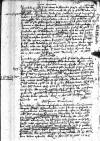Quae Fraternitas Vestra ad nos de ⌊Alexandro⌋ ⌊⌋, ad ea XVI huius superinscribed in place of crossed-out heri illi⌈heri illi 1547-11-16⌊XVI huius1547-11-16⌋ XVI huius superinscribed in place of crossed-out heri illi⌉ sufficienter respondimus communicando illi, quae ex aula regis superinscribed⌈⌊regis⌋regis superinscribed⌉ de eadem causa ad nos scripta erant on the margin in place of crossed-out accepimus⌈accepimus ad nos scripta erant ad nos scripta erant on the margin in place of crossed-out accepimus⌉, ⌊⌋. Unde facile intelliget rem se longe secus se habere, quam fautores ⌊Alexandri⌋ iactitant. Nec dubitamus nos plures in aula
Nec fuit molestum nobis c in causa Fraternitatis Vestrae et, quam Fraternitas Vestra cum suis ⌊fratribus⌋ ⌊Gedani⌋ habet ratione fund aedium habet, ad dominum ⌊Ioannem a Werdenn⌋ ⌊⌋. Utinam multum hoc vobis prodesset ⌊Qui⌋ utinam nomine nostro non gravatim operam suam s causae illi, quod eum facturum esse non dubitamus, impenderet, esset hoc nobis profecto gratissimum. Nec deerimus posthac rebus superinscribed⌈rebusrebus superinscribed⌉ Fraternitatis Vestrae, sed eas Et si posthac Fraternitati Vestrae et eiusdem ⌊fratribus⌋ in multis prodesse poterimus, fa non sumus illis operam nostram denegaturi.
Quod ⌊Valentinus⌋, frater Vestrae Fraternitatis Vestrae, ratio valetudinis suae curam gerit et opera ⌊medici⌋ opera utitur, nobis non displicet, modo eam sanitatem, quam cupit, illi medicus restituere posset.
Fraternitatem Vestram bene valere cupimus.

 AAWO, AB, D. 70, f. 333v
AAWO, AB, D. 70, f. 333v